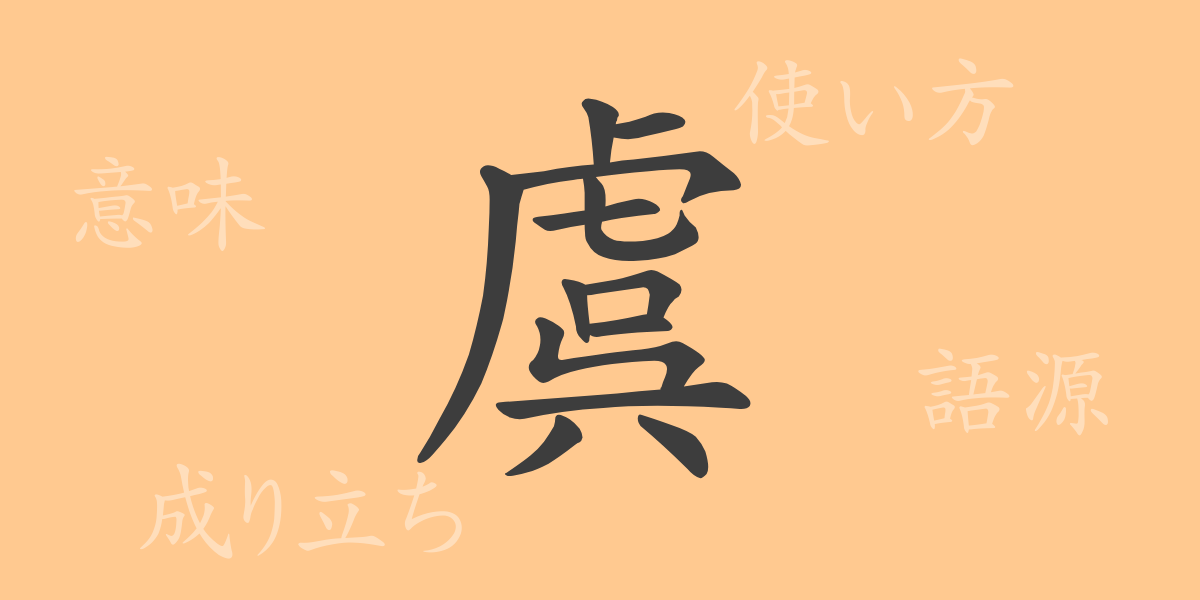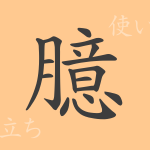“
The meaning and history hidden within a single kanji character tell the depth of the Japanese language. The common Japanese kanji “”虞”” (Gu) is a unique character that expresses a feeling of concern or unexpected situations, as its shape suggests. In this article, we will provide a detailed explanation of “”虞”” (Gu), from its origin to its meaning, usage, reading, and even compound words. Let’s unravel the stories contained in each kanji and rediscover the beauty of the Japanese language.
The Origin (Etymology) of 虞 (Gu)
The origin of the kanji “”虞”” (Gu) is ancient, and its shape is derived from ancient Chinese pictographs. Originally, it is believed to have evolved from the character “”罘”” (Fu), which meant a trap, and later came to be used with the connotations of “”worry”” or “”concern.”” Additionally, “”虞”” (Gu) is also related to the legendary Chinese figure Yu Shun, and it is sometimes used in the context of idealizing his reign.
The Meaning and Usage of 虞 (Gu)
The kanji “”虞”” (Gu) has meanings such as “”worry,”” “”concern,”” “”anticipation,”” and “”expectation.”” In modern Japanese, it is primarily used to mean “”concern,”” “”apprehension,”” or “”unexpected situations,”” and depending on the context, it can have either positive or negative nuances. For example, “”虞がある”” (Gu -ga aru) means “”there is a concern,”” while “”無虞”” (Mugu) means “”a state without worries.””
Reading, Stroke Count, and Radical of 虞 (Gu)
The kanji “”虞”” (Gu) has multiple readings in Japanese.
- Reading: The on’yomi is “”ぐ”” (Gu), and the kun’yomi is “”おそれ”” (Osore).
- Stroke Count: 13 strokes
- Radical: 虍 (Torakanmuri)
Idioms, Phrases, and Proverbs Using 虞 (Gu) and Their Meanings
Here are some of the idioms, phrases, and proverbs that include “”虞”” (Gu):
- 無虞 (Mugu): The absence of worries or dangers.
- 虞犯 (Guhan): The occurrence of worries or dangers.
- 虞美人草 (Gubijinsō): A type of plant, also known as “”poppy,”” with flower language meanings such as “”consolation”” and “”peace.””
- “”虞に及ばず”” (Gu -ni -oyo-bazu): Expressing a state of being peaceful and uneventful without worries.
Summary of 虞 (Gu)
The kanji “”虞”” (Gu) is a unique character used in Japanese to express specific emotions or situations. Its variety of readings and meanings demonstrates the richness of Japanese expressions. By using it appropriately in sentences, it becomes possible to convey deeper emotions and subtle nuances. Learning the idioms and phrases that include “”虞”” (Gu) can increase your vocabulary and enhance your expressive power.
“

























